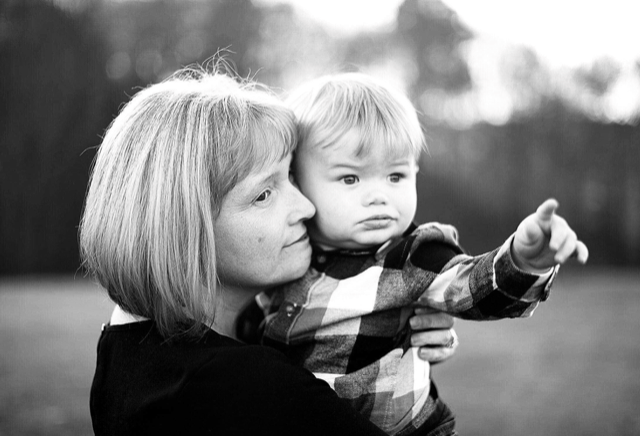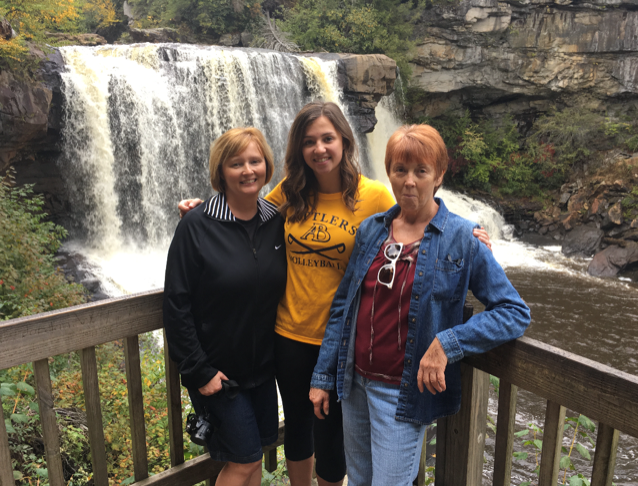
By Matthew Santamaria (msantamaria@hdsa.org)
Cincinnati resident Lauren Rogers, originally from West Virginia, is a young mother at risk for Huntington’s disease (HD), a fatal genetic disorder that causes the progressive breakdown of nerve cells in the brain. It deteriorates a person’s physical and mental abilities during their prime working years and has no cure.
On April 23, 2006, Lauren’s great grandfather passed away due to complications from HD. The symptoms of HD are described as having ALS, Parkinson’s and Alzheimer’s – simultaneously.
“When he was diagnosed, we didn’t realize what HD would take from our family,” said Lauren. “I know that when I was a young girl, my great grandfather didn’t remember who we were and would always be so mean. We simply knew that it was not him, but was the disease taking over any control that he had.”
Symptoms of HD include personality changes, mood swings, depression, forgetfulness, impaired judgement, unsteady gait, involuntary movements, slurred speech, difficulty in swallowing, and significant weight loss.
In 2010, her grandmother, mamaw, was diagnosed with HD. In 2014, her mother also tested positive for HD. Every child of a parent with HD has a 50/50 chance of inheriting the faulty gene.


“I am always so afraid that the same will happen to my mom and mamaw at some point, and my heart is just not ready for that,” said Lauren. “I wouldn’t be the woman and mother I am today without the two of them!”
Before COVID-19, her mother started a support group in Philippi, WV that met on every first Monday of the month.
“This lets people who either have HD, or have a loved one affected, come to share their stories and struggles as we have other family members deeply affected from HD as well,” Lauren explains.
To learn more about HDSA Support groups in your local area/virtual, click here
Lauren and her brother, Tyler, are at risk but have not been tested.
The decision to get genetically tested is difficult to make. Each year, 5-10% are tested. It is never the right or wrong decision to be tested. There are people that see no benefit in knowing that they will develop the disease while others want to know in order to make informed choices about their future. It can take up to several weeks to receive your results from the genetic testing center.
“Speaking for myself, I’m honestly scared,” said Lauren. “I see how it has affected both my Mom and Mamaw, and I just don’t know if I want to know right now at 26-years-old. I have a son, Nolan, who is 2 and a half years old. I have gone back and forth whether to have another child or not.”
Lauren and her family have attended several fundraisers for HDSA to show that nobody is alone in the fight against HD.
“HDSA means so much to my family and I, and we truly appreciate that HDSA continues to educate people who don’t know about HD,” Lauren explains.
###
Huntington’s disease (HD) is a fatal genetic disorder that causes the progressive breakdown of nerve cells in the brain. It deteriorates a person’s physical and mental abilities during their prime working years and has no cure. Every child of a parent with HD has a 50/50 chance of inheriting the faulty gene. Today, there are approximately 41,000 symptomatic Americans and more than 200,000 at-risk of inheriting the disease. The symptoms of HD are described as having ALS, Parkinson’s and Alzheimer’s – simultaneously.
The Huntington’s Disease Society of America is the premier nonprofit organization dedicated to improving the lives of everyone affected by HD. From community services and education to advocacy and research, HDSA is the world’s leader in providing help for today and hope for tomorrow for people with HD and their families.
HDSA was founded in 1967 by Marjorie Guthrie, the wife of legendary folk singer Woody Guthrie. Woody died from HD complications when he was only 55 years old, but the Guthrie family legacy lives on at HDSA to this day.
To learn more about Huntington’s disease and the work of the Huntington’s Disease Society of America, visit www.HDSA.org or call 1(800)345-HDSA.
This is a story featuring a personal experience with Huntington’s disease. If you would like to have your story told please contact Matthew Santamaria at msantamaria@hdsa.org
Cincinnati resident Lauren Rogers, originally from West Virginia, is a young mother at risk for Huntington’s disease (HD), a fatal genetic disorder that causes the progressive breakdown of nerve cells in the brain. It deteriorates a person’s physical and mental abilities during their prime working years and has no cure.
On April 23, 2006, Lauren’s great grandfather passed away due to complications from HD. The symptoms of HD are described as having ALS, Parkinson’s and Alzheimer’s – simultaneously.
“When he was diagnosed, we didn’t realize what HD would take from our family,” said Lauren. “I know that when I was a young girl, my great grandfather didn’t remember who we were and would always be so mean. We simply knew that it was not him, but was the disease taking over any control that he had.”
Symptoms of HD include personality changes, mood swings, depression, forgetfulness, impaired judgement, unsteady gait, involuntary movements, slurred speech, difficulty in swallowing, and significant weight loss.
In 2010, her grandmother, mamaw, was diagnosed with HD. In 2014, her mother also tested positive for HD. Every child of a parent with HD has a 50/50 chance of inheriting the faulty gene.


“I am always so afraid that the same will happen to my mom and mamaw at some point, and my heart is just not ready for that,” said Lauren. “I wouldn’t be the woman and mother I am today without the two of them!”
Before COVID-19, her mother started a support group in Philippi, WV that met on every first Monday of the month.
“This lets people who either have HD, or have a loved one affected, come to share their stories and struggles as we have other family members deeply affected from HD as well,” Lauren explains.
To learn more about HDSA Support groups in your local area/virtual, click here
Lauren and her brother, Tyler, are at risk but have not been tested.
The decision to get genetically tested is difficult to make. Each year, 5-10% are tested. It is never the right or wrong decision to be tested. There are people that see no benefit in knowing that they will develop the disease while others want to know in order to make informed choices about their future. It can take up to several weeks to receive your results from the genetic testing center.
“Speaking for myself, I’m honestly scared,” said Lauren. “I see how it has affected both my Mom and Mamaw, and I just don’t know if I want to know right now at 26-years-old. I have a son, Nolan, who is 2 and a half years old. I have gone back and forth whether to have another child or not.”
Lauren and her family have attended several fundraisers for HDSA to show that nobody is alone in the fight against HD.
“HDSA means so much to my family and I, and we truly appreciate that HDSA continues to educate people who don’t know about HD,” Lauren explains.
Lauren has a message for the HD Community:
“Never let a day go by where you don’t tell your family that you love them because you truly don’t know when it will be the last time you get to.”
“Never let a day go by where you don’t tell your family that you love them because you truly don’t know when it will be the last time you get to.”
###
Huntington’s disease (HD) is a fatal genetic disorder that causes the progressive breakdown of nerve cells in the brain. It deteriorates a person’s physical and mental abilities during their prime working years and has no cure. Every child of a parent with HD has a 50/50 chance of inheriting the faulty gene. Today, there are approximately 41,000 symptomatic Americans and more than 200,000 at-risk of inheriting the disease. The symptoms of HD are described as having ALS, Parkinson’s and Alzheimer’s – simultaneously.
The Huntington’s Disease Society of America is the premier nonprofit organization dedicated to improving the lives of everyone affected by HD. From community services and education to advocacy and research, HDSA is the world’s leader in providing help for today and hope for tomorrow for people with HD and their families.
HDSA was founded in 1967 by Marjorie Guthrie, the wife of legendary folk singer Woody Guthrie. Woody died from HD complications when he was only 55 years old, but the Guthrie family legacy lives on at HDSA to this day.
To learn more about Huntington’s disease and the work of the Huntington’s Disease Society of America, visit www.HDSA.org or call 1(800)345-HDSA.
This is a story featuring a personal experience with Huntington’s disease. If you would like to have your story told please contact Matthew Santamaria at msantamaria@hdsa.org
